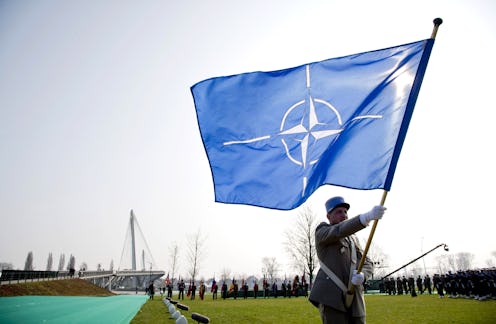News
NATO's 9/11 Memorial Provides The Closest Thing To Comfort For Victims' Families

As part of his first visit abroad since taking office, Donald Trump dedicated a 9/11 Memorial before the leaders of NATO at the organization's headquarters in Brussels, Belgium. Comprised of a piece of steel recovered from the World Trade Center, the memorial signifies the only time in NATO's history when Article 5 of the treaty — making an attack on one member nation an attack on them all — was invoked.
For the families of those who died on that day 16 years ago, the new memorial is a welcome addition.
"A piece of steel symbolizes 9/11 and what happened that day and the buildings that got knocked down," Jim Riches, a former deputy chief of the New York Fire Department who lost his son Jimmy in the tragedy, tells Bustle. "I think it sends a message to all the countries in NATO about how serious this issue is, and how they had to use the Article 5 to go against the [perpetrators]. It shows the seriousness of it, the symbolism of what happened to the world that day."
But beyond seeing the Brussels memorial as a fitting tribute, Riches and others who lost family members on that day see it as an important improvement upon the 9/11 memorial in New York. Some victims' families feel that memorial was built without their consultation, input, or consent.
"They try to make money off the memorial," says Riches. "That's the biggest disgrace of all."
"Ground Zero has turned into a tourist trap, a money pit, and basically a commercial endeavor. And that is a disgrace."
Riches' sentiment is shared by Sally Regenhard, whose son Christian was a fire fighter who also lost his life. She has advocated since 9/11 for improved building codes for buildings like the World Trade Center, hoping to prevent anything like that tragedy from happening again. Regenhard says she's upset by the New York City 9/11 Memorial and how it was built against the wishes of the families.
"Right now, today, all those human remains are down there, against the wishes of the families," she says. "And Ground Zero has turned into a tourist trap, a money pit, and basically a commercial endeavor. And that is a disgrace.
"Personally I hate the steel, because to me it's a symbol of what killed my son, the inadequacy of the building. ... However, I think it's wonderful that they are unveiling, and having this type of memorial."
Regenhard compares the site in Lower Manhattan with the ones in Shanksville, Pennsylvania and Arlington National Cemetery in Virginia, which are administered by the National Parks Service and freely open to the public. In comparison, there's a $24 entry fee to the 9/11 Memorial in New York City, which she vows to never visit. She does, however, hope to one day visit the one in Brussels.
"Personally I hate the steel, because to me it's a symbol of what killed my son, the inadequacy of the building," she says. "However, I think it's wonderful that they are unveiling, and having this type of memorial. ... I'm glad to see that there is a European or NATO country type of memorial erected there."
"I'll never be happy, but I'm gratified to see that."
For Regenhard, having a memorial at NATO headquarters reminds people in those countries of what they're defending, and how they have to remain united against terror.
"I appreciate it, because we feel that the world is forgetting about 9/11 and they're forgetting about the people who died there," she says.
"I'll never be happy, but I'm gratified to see that," says Regenhard. "I hope to be able to visit some time soon."
Riches shares her sentiment.
"I think it keeps them aware. This is what happened that day," he says. "You look at that and go 'Oh my god, look at that piece of steel.' It's a disaster. It reminds you of the tragedy that happened that day."
And remembering is key to prevention, according to Riches.
"You'll keep thinking about it. Never forget it," he says. "Don't let it happen anywhere in Europe, or in the United States or anywhere else. You don't want it to happen to anybody."